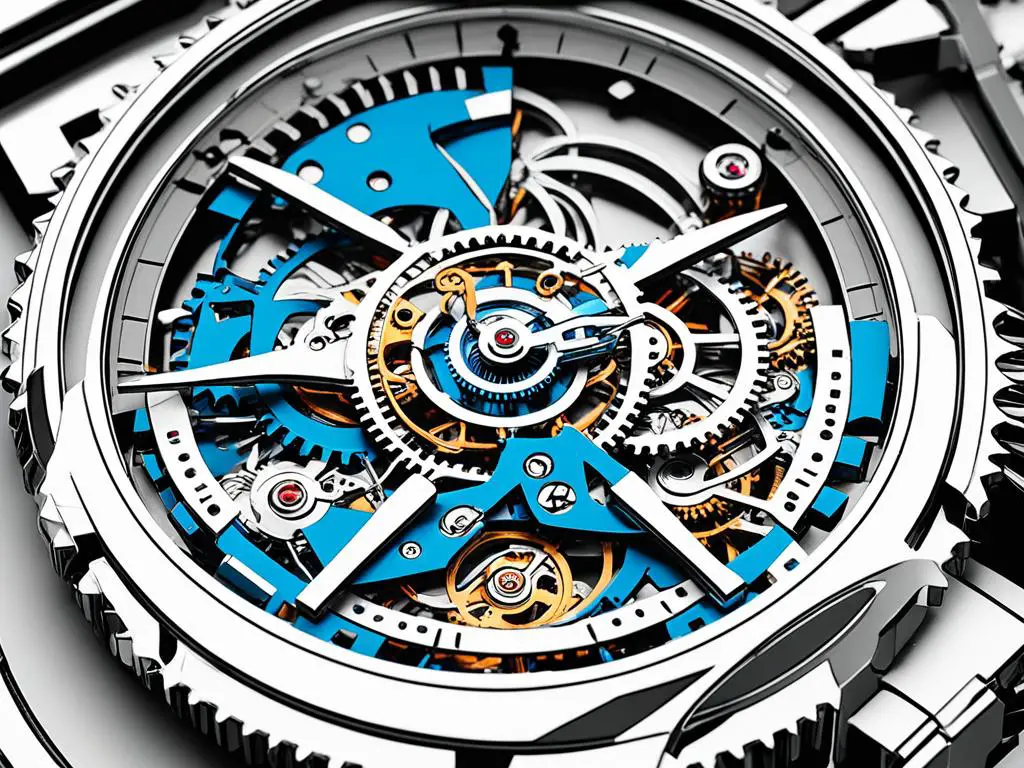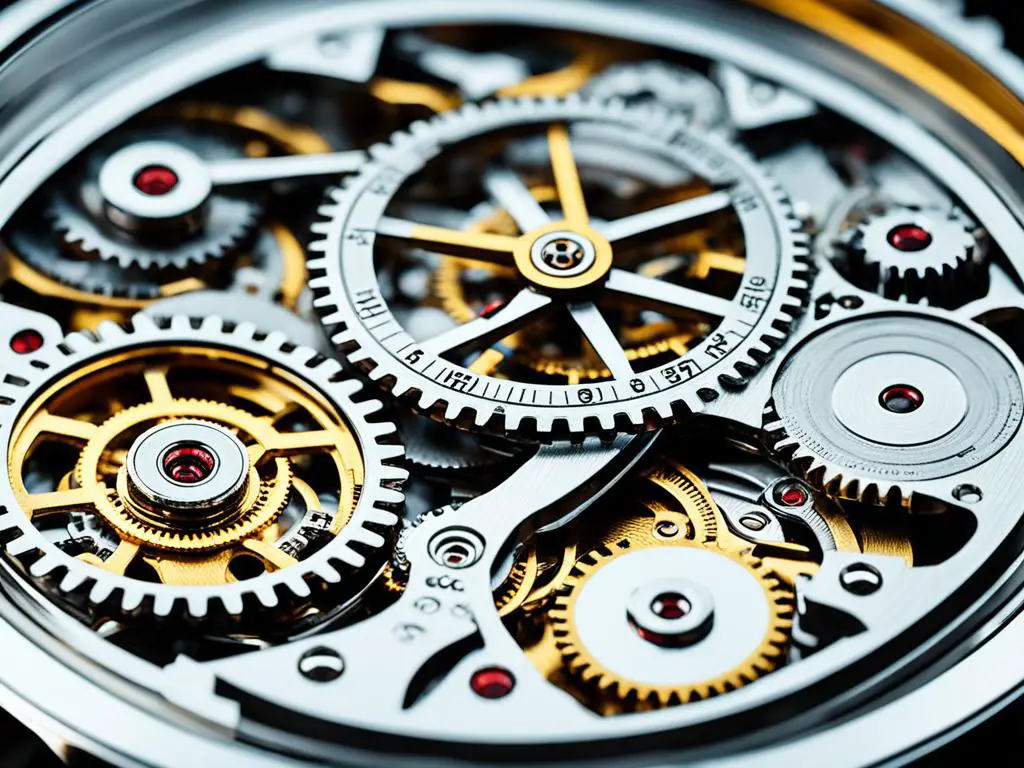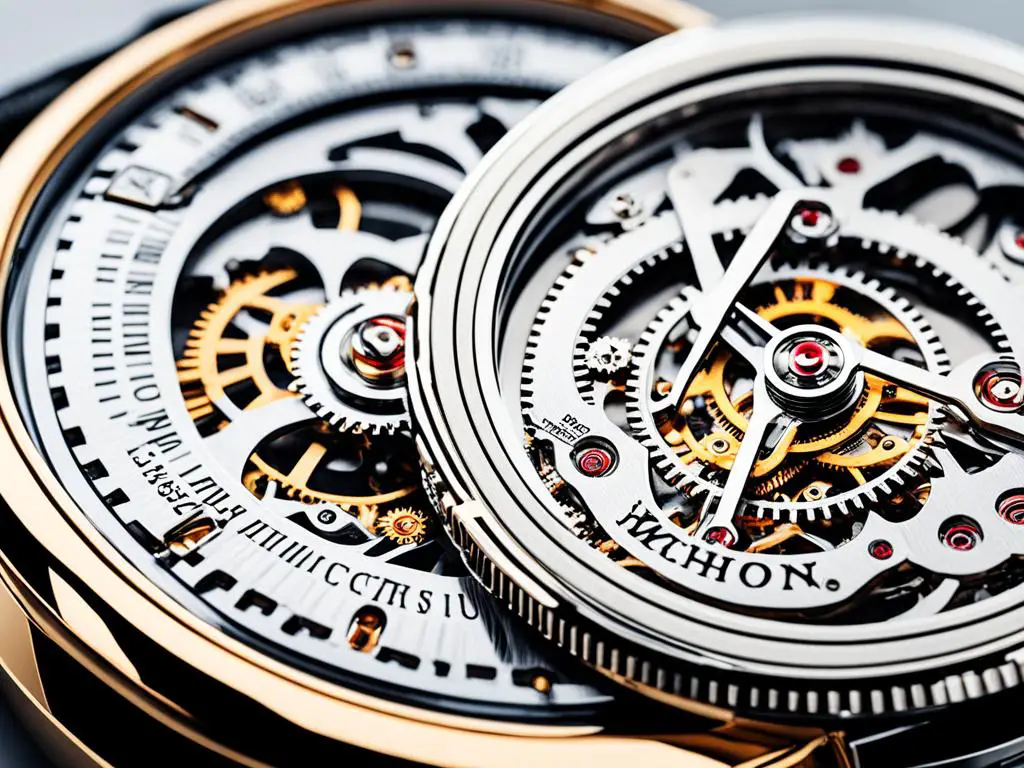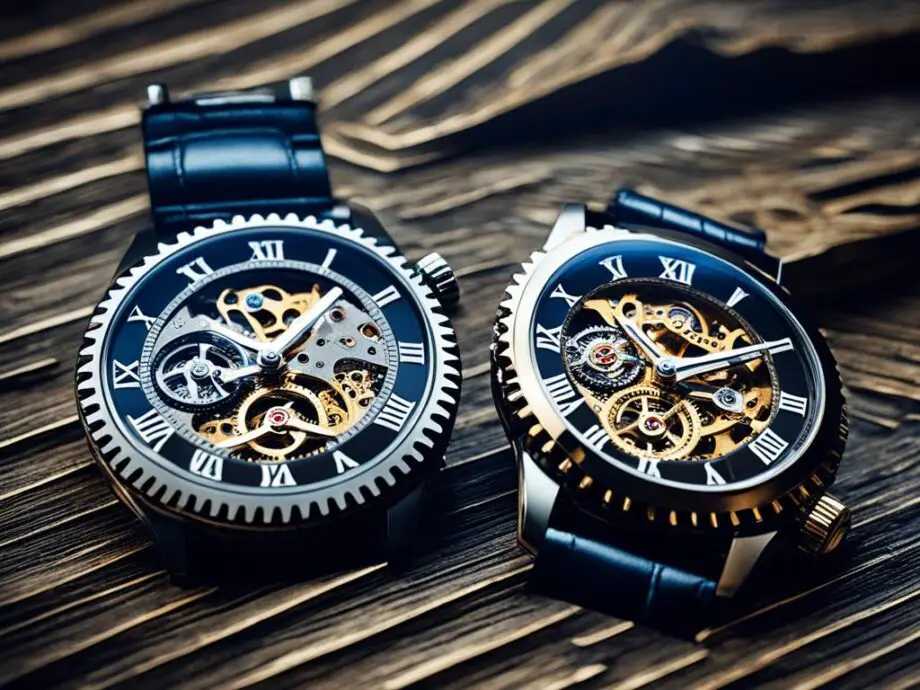When it comes to choosing a watch, there are many factors to consider. One of the most important decisions you’ll face is whether to go for an automatic or mechanical timepiece. Understanding the differences between these watch movements will help you make an informed choice that suits your needs and preferences.
Key Takeaways:
- Automatic and mechanical watches are two popular types of timepieces.
- Automatic watches utilize self-winding technology, while mechanical watches rely on manual winding.
- Automatic watches offer convenience and require less maintenance, while mechanical watches showcase traditional craftsmanship.
- Consider your lifestyle and preferences when choosing between an automatic or mechanical watch.
- Both types have their own unique characteristics and allure, so choose the one that resonates with you.
Understanding Watch Movements
Before diving into the comparison, it’s essential to understand the different types of watch movements available in the market. Watch movements are the heart and soul of a timepiece, responsible for its functionality and accuracy.
There are two main types of watch movements: automatic and mechanical. Each type has its own unique characteristics and mechanisms that set them apart.
Automatic Watch Movements
Automatic watches are also known as self-winding watches. They harness the natural motion of the wearer’s wrist to power the timepiece.
An automatic watch movement consists of a rotor, which is a weight-shaped mechanism that rotates with the wearer’s wrist movements. As the rotor turns, it transfers energy to the mainspring, which then releases the stored energy to drive the watch.
One of the key features of automatic watches is their ability to be wound by the wearer’s natural motion, eliminating the need for manual winding. This makes automatic watches ideal for individuals who wear their watches regularly.

Mechanical Watch Movements
Mechanical watches, on the other hand, rely on manual winding to power their movement. This requires the wearer to regularly wind the watch using the crown.
A mechanical watch movement consists of a mainspring, a series of gears, and an escapement mechanism. When the mainspring is wound, it stores potential energy. As the mainspring unwinds, it releases the stored energy, which is transmitted through the gears to power the hands of the watch.
Unlike automatic watches, mechanical watches do not have a rotor or rely on the wearer’s motion for power. The manual winding process adds a ritualistic element to owning a mechanical watch and is appreciated by watch enthusiasts who value the hands-on experience.
In summary, automatic and mechanical watches have different methods of powering their movements. While automatic watches rely on the motion of the wearer’s wrist, mechanical watches require manual winding. Both types of movements have their own distinct charm and appeal, catering to different preferences and lifestyles.
Automatic Watches: The Advancement of Technology
Automatic watches have revolutionized the world of horology with their advanced technology and intricate craftsmanship. These timepieces have gained significant popularity among watch enthusiasts, offering a unique blend of style, convenience, and precision.
So, how do automatic watches work? Unlike their mechanical counterparts, automatic watches are self-winding and do not require manual winding or a battery to function. They harness the natural motion of the wearer’s wrist to power the watch’s movement, utilizing a rotor that rotates with each movement of the wrist.
This ingenious automatic watch technology brings several benefits that make them an attractive choice for watch aficionados:
- Convenience: With automatic watches, you’ll never have to worry about winding them manually or replacing batteries. The continuous motion of your wrist keeps the watch powered, ensuring it’s always ready to use.
- Accuracy: Automatic watches are known for their exceptional accuracy, thanks to their precise internal mechanisms. They offer reliable timekeeping, ensuring you never miss a beat.
- Perpetual Motion: The perpetual motion of an automatic watch ensures that it stays in good working condition, even if you don’t wear it every day. The power reserve in automatic watches allows them to keep running for several hours or even days when not worn.
- Exquisite Craftsmanship: Automatic watches are a testament to the artistry and craftsmanship of watchmakers. Each timepiece is intricately designed and assembled with meticulous attention to detail, reflecting the heritage and experience behind the brand.
- Versatility: Automatic watches come in a wide variety of styles, designs, and complications, catering to different tastes and preferences. Whether you prefer a sleek dress watch or a rugged diving watch, there’s an automatic timepiece for every occasion.

Automatic watches continue to evolve, incorporating innovative features and materials that enhance their performance and durability. From chronographs and moon phase complications to robust materials like stainless steel and ceramic, these timepieces combine cutting-edge technology with timeless elegance.
Next, we will explore the inner workings of mechanical watches, appreciating their classic appeal and the craftsmanship they represent.
Mechanical Watches: The Classic Choice
When it comes to timepieces, mechanical watches hold a special place in the hearts of watch aficionados. These intricately crafted instruments have stood the test of time and continue to captivate enthusiasts with their traditional craftsmanship and timeless appeal.
But how does a mechanical watch work? Let’s take a closer look at the inner workings of these mechanical marvels. At the heart of a mechanical watch is a complex system of gears, levers, and springs that work in harmony to measure time with precision.
The main source of power for a mechanical watch is a tightly wound spring, known as the mainspring. As the mainspring unwinds, it releases energy, which is transmitted through a series of gears to move the watch’s hands and power other functions, such as the date or moon phase complications.
One of the defining characteristics of a mechanical watch is its reliance on manual winding. To keep a mechanical watch running, the wearer must manually wind the crown, which tightens the mainspring. This ritualistic act adds a sense of connection and involvement, making each timepiece feel personal and cherished.
“A mechanical watch is more than just a timekeeping device; it’s a testament to human ingenuity and craftsmanship.”
The intricate mechanisms of a mechanical watch are a true work of art. Each tiny gear is meticulously crafted, ensuring smooth movement and accurate timekeeping. The beauty of these mechanical wonders lies not only in their functional elegance but also in the attention to detail put into their design.
The Advantages of a Mechanical Watch
- Long-lasting: With proper care and maintenance, a mechanical watch can last a lifetime, becoming a cherished heirloom to pass down through generations.
- Quality Craftsmanship: Mechanical watches are hand-assembled by skilled watchmakers, showcasing the artistry and dedication that goes into their creation.
- Soulful Timekeeping: The rhythmic ticking and delicate movement of a mechanical watch add a sense of nostalgia and romance to the act of tracking time.
Whether it’s the intricate mechanics, the attention to detail, or the sheer beauty of a well-crafted timepiece, mechanical watches continue to hold a special place in the world of horology. They offer a unique blend of tradition, craftsmanship, and aesthetic appeal that sets them apart from their contemporary counterparts.
The Differences Between Automatic and Mechanical Watches
Now that we have a good understanding of automatic and mechanical watches, let’s examine the key differences between these two types of timepieces. From their power source to maintenance requirements, we will compare and contrast the characteristics of automatic and mechanical watches.
Power Source
One of the fundamental differences between automatic and mechanical watches lies in their power source. Automatic watches are powered by the natural motion of the wearer’s wrist, utilizing a self-winding mechanism. On the other hand, mechanical watches require manual winding by the wearer to keep them running.
Mechanism
In terms of the mechanism, automatic watches feature a rotor that winds the mainspring as it rotates with the motion of the wrist, storing energy to power the watch. This mechanical movement allows for the watch to remain continuously wound as long as it is worn regularly. Mechanical watches, on the other hand, rely entirely on manual winding to keep the mainspring tensioned and the watch functioning.
Precision
When it comes to precision, both automatic and mechanical watches can offer accurate timekeeping. However, automatic watches tend to be more accurate due to their continuous winding and the presence of small regulating mechanisms that help adjust the movement’s speed. Mechanical watches may require occasional adjustments to maintain accurate timekeeping.
Maintenance
In terms of maintenance, automatic watches are typically easier to care for. The continuous winding mechanism helps keep the watch running without the need for regular manual winding. However, they still require occasional servicing to ensure optimal performance. Mechanical watches, on the other hand, require regular manual winding and more frequent servicing to maintain accuracy and functionality.
Style and Variety
Both automatic and mechanical watches come in a wide range of styles and designs to suit individual preferences. Automatic watches often feature a transparent case back, allowing wearers to admire the intricate movement. Mechanical watches, on the other hand, embody a classic and timeless aesthetic, with a focus on traditional craftsmanship.

In summary, while automatic and mechanical watches share similar allure and craftsmanship, they differ in their power source, mechanism, precision, maintenance requirements, and style. Understanding these differences can help you make an informed decision when choosing the perfect timepiece to complement your lifestyle and personal taste.
Automatic Watch vs Manual Watch: Which is Right for You?
When it comes to choosing between an automatic watch and a manual watch, the decision ultimately depends on your personal preferences and lifestyle. Both types of watches offer unique features and advantages, catering to different needs and tastes.
Let’s explore the factors you should consider when deciding between these two options:
- Mechanism: Automatic watches, also known as self-winding watches, are powered by the natural motion of the wearer’s wrist. They feature a rotor that winds the mainspring, eliminating the need for manual winding. On the other hand, manual watches require regular winding by hand to keep them running.
- Convenience: Automatic watches are convenient for individuals who don’t want the hassle of regular winding. With their self-winding mechanism, they continue to function as long as they are worn regularly. On the contrary, manual watches require regular winding, typically on a daily basis, to maintain accurate timekeeping.
- Accuracy: Both automatic and manual watches can offer precise timekeeping. However, automatic watches tend to be more consistent in their accuracy due to the continuous winding provided by the wearer’s wrist movement. Manual watches may require more frequent adjustments to ensure accuracy.
- Interaction: Manual watches provide a more hands-on experience for watch enthusiasts. The process of manually winding the watch every day can create a deeper connection with the timepiece. Some individuals appreciate this interaction and the ritual involved.
- Aesthetics: Automatic watches often have transparent case backs, allowing you to admire the intricate mechanical movement. If you appreciate the beauty of horological craftsmanship, an automatic watch may be more appealing to you. Manual watches can also be visually stunning, with their intricate movements and traditional design.
- Maintenance: Automatic watches require less maintenance compared to manual watches. Regular use keeps the watch wound and ensures smooth operation. However, occasional servicing, such as cleaning and oiling, is still necessary. Manual watches need regular winding and occasional servicing to maintain optimal performance.
In summary, choosing between an automatic watch and a manual watch is a matter of personal preference. If you prefer the convenience of a watch that winds itself and requires less maintenance, an automatic watch may be the ideal choice for you. On the other hand, if you enjoy the hands-on experience of winding your watch daily and appreciate the interaction, a manual watch might be more suitable.
Remember to consider your lifestyle, aesthetic preferences, and the level of engagement you desire with your timepiece. Ultimately, the perfect watch is one that not only aligns with your needs but also brings you joy every time you look at it.
| Automatic Watches | Manual Watches |
|---|---|
| Powered by natural wrist movement | Require regular manual winding |
| Convenient for daily wear | Interaction through manual winding |
| More consistent accuracy | May require more frequent adjustments |
| Transparent case backs to showcase movement | Intricate movements and traditional design |
| Less maintenance required | Regular winding and occasional servicing |
With these considerations in mind, you can make an informed decision that aligns with your horological preferences and lifestyle.
Pros and Cons of Automatic and Mechanical Watches
No watch type is without its pros and cons. When deciding between an automatic watch and a mechanical watch, it’s essential to consider the advantages and disadvantages of each. Let’s take a closer look at the key factors to help you make an informed decision when purchasing a timepiece.
Advantages of Automatic Watches
- Convenience: Automatic watches are self-winding, meaning they don’t require manual winding like mechanical watches. They are powered by the motion of the wearer’s arm, making them hassle-free and low maintenance.
- Accuracy: Automatic watches are known for their accurate timekeeping due to their advanced mechanisms. They often feature high-quality movements that provide precise and reliable timekeeping.
- Wide Selection: Automatic watches come in a wide range of styles, designs, and price points. Whether you prefer a sporty diver’s watch or an elegant dress watch, there’s an automatic timepiece to suit every taste.
Disadvantages of Automatic Watches
- Price: Automatic watches tend to be more expensive than their mechanical counterparts due to the advanced technology and craftsmanship involved in their construction.
- Power Reserve: If an automatic watch is not worn regularly, it may lose its power reserve and stop running. This can be inconvenient if you have multiple watches in your collection.
- Maintenance: Automatic watches require periodic servicing to ensure optimal performance and longevity. This includes cleaning, oiling, and regulating the movement, which can add to the overall cost of ownership.
Advantages of Mechanical Watches
- Artistry: Mechanical watches are a true testament to traditional craftsmanship. From the intricate movement components to the intricate dials and case designs, mechanical watches are often regarded as works of art.
- Legacy: Mechanical watches have a rich history and heritage that appeals to watch enthusiasts and collectors. They embody the essence of classical watchmaking and can become treasured heirlooms.
- Connection: Wearing a mechanical watch creates a personal connection with the timepiece. The act of winding it daily and observing the intricate movement in action adds to the overall experience and appreciation.
Disadvantages of Mechanical Watches
- Maintenance: Mechanical watches require regular manual winding to keep them running. For some, this hands-on experience is part of the charm, but it can also be viewed as an inconvenience for those seeking a more effortless timekeeping solution.
- Accuracy: Compared to automatic watches, mechanical watches may be slightly less accurate. They can gain or lose a few seconds of time per day, requiring occasional adjustment to keep them on track.
- Limited Styles: While mechanical watches offer a wide range of styles, they may not have the same variety as automatic watches. Some might find that the design options for mechanical watches are more limited.
“The choice between an automatic watch and a mechanical watch ultimately depends on your personal preferences, lifestyle, and budget. Consider the convenience and accuracy of automatic watches, or the craftsmanship and legacy of mechanical watches. Whichever you choose, you’ll be investing in a timepiece that reflects your unique style and appreciation for horology.” – Watch Enthusiast
Comparison Table: Automatic Watch vs. Mechanical Watch
| Aspect | Automatic Watch | Mechanical Watch |
|---|---|---|
| Power Source | Self-winding, powered by the wearer’s arm movement | Manual winding by rotating the crown |
| Convenience | Hassle-free, no manual winding required | Requires regular manual winding |
| Accuracy | Precise and reliable | Potentially slightly less accurate |
| Maintenance | Periodic servicing required | Periodic servicing required |
| Price | Can be more expensive | Can be less expensive |
| Styles | Wide variety available | Limited variety compared to automatic watches |
| Legacy and Artistry | N/A | Rich history and craftsmanship |
Conclusion
In conclusion, both automatic and mechanical watches offer their own unique characteristics and allure. Automatic watches, with their advanced technology and self-winding mechanism, provide convenience and reliability. On the other hand, mechanical watches showcase traditional craftsmanship, appealing to those who appreciate the artistry and precision that goes into their creation.
When choosing between an automatic watch and a mechanical watch, it’s important to consider your lifestyle, preferences, and budget. If you value the convenience of a watch that winds itself and keeps accurate time without manual intervention, an automatic watch may be the ideal choice for you. However, if you enjoy the hands-on experience of manually winding your watch and appreciate the historical significance of mechanical watches, then a mechanical timepiece may better suit your style.
Ultimately, whether you opt for an automatic or mechanical watch, both choices offer a touch of sophistication and elegance to your wrist. The decision should reflect your personal taste and align with your individual needs. Take the time to explore different brands, models, and designs to find the perfect watch that resonates with your unique personality and enhances your personal style.
